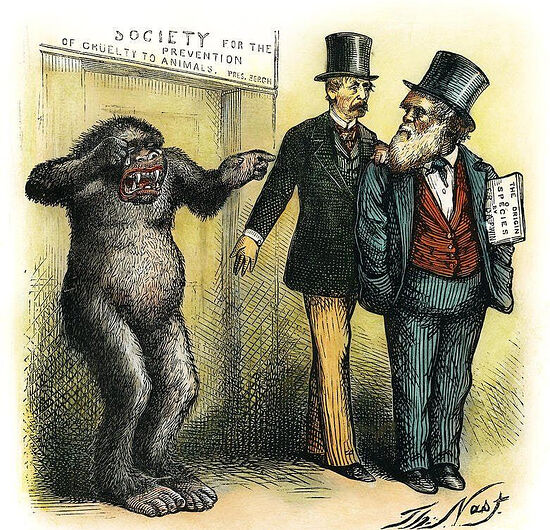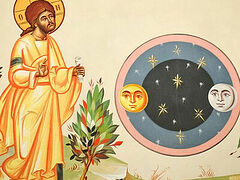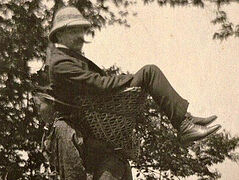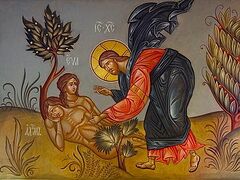 A ape is offended that Darwin called himself its descendant.
A ape is offended that Darwin called himself its descendant.
Glory to the Father, and to the Son, and to the Holy Spirit, now and ever, and unto the ages of ages. Amen.
Through the prayers of our Holy Fathers Lord Jesus Christ, Son of God, have mercy on us. Amen.
Introduction
We talked about meekness and simplicity, and now we definitely need to talk about humility. But as far as humility is concerned, I completely agree with St. John Climacus, who said that he who has no humility does not care what it is, and he who has it cannot speak about it. It’s like trying to describe the taste of honey to someone who has never tasted it. Or, to give more modern definitions, it’s like trying to explain to a deaf person what music is. We would tell him that this is an order, combination, or interference of vibrations, pressure variations, or particle velocities in a certain medium. These vibrations have a frequency range of twenty to 20,000 Hz. Then the deaf person will say:
“Thank God that I finally understood what music is!”
But then he will ask perplexedly:
“But why is everyone so interested in it?”
Do you understand? Someone who has never tasted the love of God has a similar attitude towards humility, because in fact humility is a feeling and the work of the love of God in a person’s life. This love is so sweet that it encourages a person filled with happiness to repent of all his sins and weaknesses with his whole being. This state is utterly blissful, and yet it is full of a certain moderation, sensitivity, and fear of spoiling, destroying this crown of beauty, this Divine state, which is as fragile as a spider’s web. It is an extremely subtle state that disappears once we become “barbarians” or “animals,” and wound the soul, distancing ourselves from God and slapping love in the face.
The Definition of Humility
Truly, brethren, it is very hard to be humble, because ancestral sin, death, the fall of Adam and the continuation and spread of this mortal state afterwards turned us into animals. You know that there is such a Latin proverb: “homo homini lupus”, which means “man is a wolf to man.” And now, since we have started talking about animals and humility, I recall the definition of humility that Fr. Raphael (Noica) gave me: Humility is accepting the truth as it is, and not as we would like it to be. The truth is that we humans did not evolve from animals, because we have eternal souls and we are the image of God. But due to sin, we have become worse than animals. Brethren, we must never forget this if we want to attain salvation.
The struggle against the truth
Today, alas, there is a fierce war against the truth because the truth is the most important thing for our salvation. Its most famous enemy is Darwinian theory, which states that we evolved from apes; a theory that in its classical form was refuted in the scientific world decades ago. Why? Because in fact not a single piece of evidence has been found in fossils that could confirm the continuity of evolution proclaimed by Darwinian theory—that is, there is no “missing link”, and in fact there are even several missing links. For this reason, the theory was far-fetched: it claims that evolution manifests itself in leaps and bounds, which has been refuted today, again due to the lack of clear evidence.
It may be useful for you to know that the so-called “proofs” of evolutionists are indirect ones, which apply only to individual cases, but are arbitrarily transferred to complex systems. Because there is a huge interest in the spread of this theory.
Curiously enough, the absence of the “missing links” actually indicates that species differ from each other, even if they adapt to their environments. St. Maximus the Confessor made it very clear when he said that species do not transform from one to another, because no species changes its purpose, its state (λόγος in Greek), the aim for which it was created.
If God improves the design and reuses what He Himself created in another form of His creation, it means that He is a wise and skillful Creator Who does not contradict Himself, and not that one species evolves from another. Brethren, this is a fact. We must be extremely careful, brethren! For example, take a look at my hand: I have a little finger, a ring finger, a middle finger, an index finger and a thumb. Do you see that they look very similar and are arranged in an apparent evolution? But it does not mean that they evolve from one another, but that all these fingers have one common source—they were created by one Creator.
Brethren, randomness and explosion, even the “Big Bang”, do not create order and reason. If you accidentally detonate a Molotov cocktail or an atomic bomb, you will not create order; on the contrary: you will have to wait for the consequences of the explosion to pass so that someone smart can restore order. When it comes to randomness, do you think that the human eye is a product of chance? Or, if we assume that you flew to a faraway planet and found a very complex clock in the desert that is perfectly accurate, would you think that this is a product of chance? No, certainly not!
This, of course, does not exclude the possibility of environmental adaptability and genetic mutations within the same species, which God provided out of His love so that the species, and especially man, could respond to various changes that arise in the course of history. But still, as St. Paisios said, a cucumber can become better and you can improve tomato, but you can’t turn a chimpanzee into a human, no matter how hard you try. Do you understand?
You see, our very consciousness resists this. If someone calls another person an evolved chimpanzee, an evolved orangutan, or an evolved gorilla, it will be perceived as an insult, and in all fairness. Man is something fundamentally different: he was created in a completely different way (that is, by Divine counsel, not by His word) and for a different purpose—for theosis.
The problem with modern science is that it only deals with the immanent. It is a science without God, an ultimate goal, or real meaning. Evolutionism tries to patch this up without providing a fulfilling explanation for personality, because it confines man in the realm of animals and in the realm of chance. In addition, evolution is based on the struggle for existence between species, natural selection, and the urban jungle, which totally contradicts the healthy state of a loving and peaceful soul.
In fact, evolutionism is turned towards death, in which the rational soul has no place, and it knows it. It accumulates, memorizes, improves, struggles in labyrinths without meaning and eventually everything disappears in death! This is so-called evolutionism.
There is no absurdity
Everything would be ominously absurd if there were no Paradise and no eternal life. This can be seen in the example of modern atheistic art, especially music. Do not listen to it, brethren, because it will drive you into depression or rebellion. Only theosis, the attainment of a perfect likeness to God as far as possible, can quench man’s thirst for victory, for an end goal.
You see that animals have souls subordinate to matter—they limit their interests to the flesh, mainly food and sexual life. They don’t know more than that. We see that throughout the period of history spanning several thousand years, which we know very well, animals have never had a tendency to build a spiritual civilization or to grow spiritually. They do not ask spiritual questions, do not experience the drama of sin, and do not set spiritual improvement as their main goal and occupation. As we said, they are limited to the flesh. And what we call intelligence in animals is actually the ability to learn and adapt, also limited by their bodily needs, the flesh—the things that make their bodies feel good.
Today, since we have begun to limit our lives to the flesh, many do not see a problem in the fact that we allegedly evolved from apes, from a common ancestor. Moreover, the vision of humans as advanced animals lulls a person’s conscience, which torments him if he behaves brutally or aggressively with others, because then he justifies himself by the “struggle for existence”, saying: “This is life! Big fish eat little fish!”
You can see that Darwinian theory has become the dominant ideology in atheistic, aggressive societies, even if it has not succeeded in zoology. Why? Because it asserts and legitimizes the aggressiveness of society. For this reason, St. Justin (Popovich), was strongly opposed to Darwinism.
If everything comes down to blind, random evolutionism—even if there is a God somewhere above—then the problem of ancestral sin (the sin that oppresses us so much) disappears. The need for salvation and for the Savior also disappears, which means that the Resurrection and the phenomenon of holiness are eliminated. According to atheistic science, sin does not exist. There is only blind progress without real meaning, which crashes apart against the wall of death.
Brethren, only Christ offers us salvation and the defeat of death. Brethren, we have more evidence of the Resurrection of Christ than of the existence of Julius Caesar. Study, brethren, the New Testament a little more broadly than its theological aspect, examine the historical and philological quality of the books of the New Testament—and you will see that if we do not accept the facts recorded there, then we should not accept anything at all from the era of Antiquity. Of all the books written in Antiquity, from a historical and philological point of view, nothing compares with the philological and historical quality of the corpus of the New Testament. For this reason, we have more evidence of the Resurrection of Christ than the existence of Julius Caesar.
As for the miracles of the saints, truckloads of books have been written, coming from too many sources, absolutely independent of each other, for all this to be manipulation (in addition to those miracles that I know about from people who are still alive or those that occurred to me personally).
Two stories concerning eternity
Of course, these miracles testify to the immortality of the soul. I have already talked about such miracles in several videos. Now I will only recall the case of a monk who died, and when after some time they wanted to lower him into the grave, he suddenly rose and told those around that Christ had sent him back to confess a sin and he needed a priest. Of course, everyone was shell-shocked. A priest came up, the “resurrected” monk whispered something briefly in his ear, after which he lay down in the coffin and fell asleep again. And it all happened within five minutes. Such miracles occur not only to monastics, but also to laymen.
I also told you about an elderly couple. When the husband died, leaving his wife alone, she cried over his coffin at the Vigil in church and reproached him for leaving her alone. To comfort the poor old woman, the people around her tried to divert her attention and asked her what food she wanted to prepare for the wake. At that moment the deceased rose to ninety degrees in the coffin, leaving everybody dumbfounded, and uttered:
“Cook stuffed cabbage rolls for me!”
Do you understand? I really like this miracle. Besides, I was an eye-witness to it.
Man has an eternal soul, brethren, as the Holy Scriptures show in many places. In addition to many cases of rising from the dead in the Old and New Testaments, we have the Book of Job where God promises Job as a reward for his patience to give him twice as many children and twice as many cattle. Although He really gave him twice as many animals, He gave him the same number of children. Why? Because the children who had died before live forever, whereas animals do not have an eternal soul, as St. Maximus the Confessor asserts.
A miracle with Elder Joseph
Since we're talking about miracles and Darwin, I can’t help but recall St. Joseph the Hesychast, who once came to the cathedral church of St. Basil’s Skete, found a layman there and felt a bad stench coming from him. The saint came up to him and said that he had committed a grave sin. The man did not know what he was talking about, but he was disposed to talk to the saint. During the conversation that took place after that it turned out that although the man had graduated from the Theology Department, had written a book in support of Darwinian theory. Do you understand?
The stench of people who committed grave sins was felt and is still felt by spiritual people, by the saints. And I hear about it quite often on Mt. Athos. For example, St. Ephraim of Katounakia spoke about that more than once as well.
A story from the life of St. Paisios
If we are talking about the Athonite saints, then it’s worth mentioning that St. Paisios was critical of the theory of evolution from one species to another. He said that man had learned to make rockets for so many thousands of years, whereas not a single ape had been able to invent a bicycle. And he was right. St. Paisios would say:
“When I see a chimpanzee inventing and assembling a bicycle, I’ll believe it.”
In fact, St. Paisios had a wonderful experience related to this in his childhood. He was very virtuous from an early age, so his brother envied him. He tried in every possible way to make him turn away from the Church and Christ, because he knew that little Arsenios, the future St. Paisios, loved Christ very much. One day a guest came who was an ardent advocate of Darwinian theory, and he assured little Arsenios’ brother that he would out-argue him. He found Arsenios and told him:
Listen, I won’t say that Christ was a bad man. No. Christ was one of the great initiates of mankind on a par with Buddha, Mohammed and others. But man was not created by God, because God does not exist. Man evolved from apes through the process of natural selection.
It crushed the inner world of little Arsenios, and every day he began to weep and run to St. Barbara’s Chapel, which stood not far from their house, and pray there in solitude. After a fierce battle with thoughts and a feeling of utter God-forsakenness, little Arsenios got totally exhausted and called out to Christ with his whole being.
“Lord, I don’t know if You are God or not. But since You’ve been so kind to us, I still love You alone!”
Then the royal doors of the chapel opened by themselves, and Christ Himself appeared standing in them, alive and full of love, with an open book in His hand. And the Lord told little Arsenios the words written in the book that He was holding open:
I am the resurrection, and the life: he that believeth in Me, though he were dead, yet shall he live (Jn. 11:25).
At that moment all the evil and darkness disappeared from the heart of little Arsenios, and his whole being was filled with light.
To be continued…



